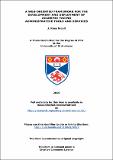Files in this item
A web-oriented framework for the development and deployment of academic facing administrative tools and services
Item metadata
| dc.contributor.advisor | Allison, Colin | |
| dc.contributor.author | Nicoll, J. Ross | |
| dc.coverage.spatial | xi, 259 | en_US |
| dc.date.accessioned | 2015-06-22T14:04:10Z | |
| dc.date.available | 2015-06-22T14:04:10Z | |
| dc.date.issued | 2015-06-24 | |
| dc.identifier.uri | https://hdl.handle.net/10023/6857 | |
| dc.description.abstract | The demand for higher education has increased dramatically in the last decade. At the same time, institutions have faced continual pressure to reduce costs and increase quality of education, while delivering that education to greater numbers of students. The introduction of software systems such as virtual learning environments, online learning resources and centralised student record systems has become routine in attempts to address these demands. However, these approaches suffer from a variety of limitations: They do not take all stakeholders’ needs into account. They do not seek to reduce administrative overheads in academic processes. They do not reflect institution-specific academic policies. They do not integrate readily with other information systems. They are not capable of adequately modelling the complex authorisation roles and organisational structure of a real institution. They are not well suited to rapidly changing policies and requirements. Their implementation is not informed by sound software engineering practises or data architecture design. Crucially, as a consequence of these drawbacks such systems can increase administrative workload for academic staff. This thesis describes the research, development and deployment of a system which seeks to address these limitations, the Module Management System (MMS). MMS is a collaborative web application targeted at streamlining and minimising administrative tasks. MMS encapsulates a number of user-facing tools for tasks including coursework submission and marking, tutorial attendance tracking, exam mark recording and final grade calculation. These tools are supported by a framework which acts as a form of “university operating system”. This framework provides a number of different services including an institution abstraction layer, role-based views and privileges, security policy support integration with external systems. | en_US |
| dc.language.iso | en | en_US |
| dc.publisher | University of St Andrews | |
| dc.rights | Creative Commons CC0 1.0 Universal | |
| dc.rights.uri | http://creativecommons.org/publicdomain/zero/1.0/ | |
| dc.subject | Higher education | en_US |
| dc.subject | Administrative overheads | en_US |
| dc.subject | Web framework | en_US |
| dc.subject | Process analysis | en_US |
| dc.subject.lcc | QA76.76S63N5 | |
| dc.subject.lcsh | Web applications | en_US |
| dc.subject.lcsh | Software frameworks | en_US |
| dc.subject.lcsh | Universities and colleges--Administration--Computer network resources | en_US |
| dc.subject.lcsh | Overhead costs | en_US |
| dc.title | A web-oriented framework for the development and deployment of academic facing administrative tools and services | en_US |
| dc.type | Thesis | en_US |
| dc.type.qualificationlevel | Doctoral | en_US |
| dc.type.qualificationname | PhD Doctor of Philosophy | en_US |
| dc.publisher.institution | The University of St Andrews | en_US |
This item appears in the following Collection(s)
Items in the St Andrews Research Repository are protected by copyright, with all rights reserved, unless otherwise indicated.


